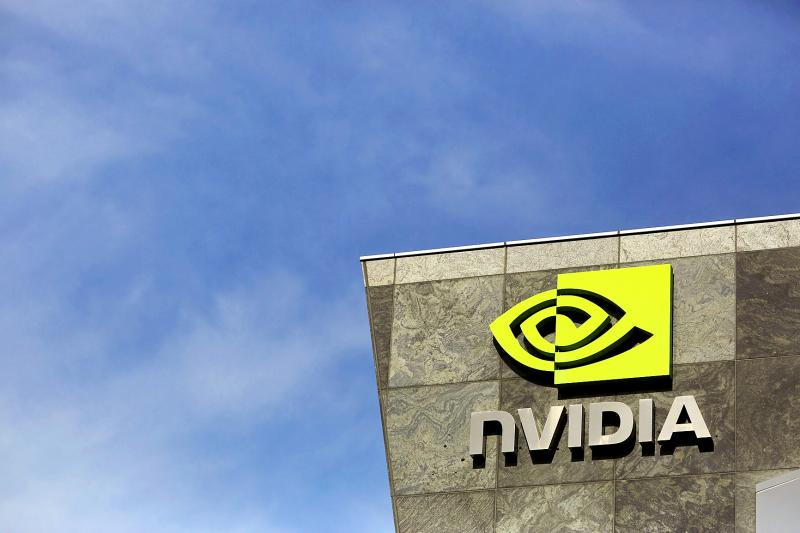Nvidia Corp is quietly preparing to abandon its purchase of Arm Ltd from Softbank Group Corp after making little to no progress in winning approval for the US$40 billion chip deal, people familiar with the matter said.
Nvidia has told partners that it does not expect the transaction to close, said one person, who asked not to be identified because the discussions are private.
Meanwhile, Softbank is stepping up preparations for an Arm initial public offering as an alternative to the Nvidia takeover, another person said.

Photo: Reuters
The purchase — poised to become the biggest semiconductor deal in history when it was announced in September 2020 — has drawn a fierce backlash from regulators and the chip industry, including Arm’s own customers.
The US Federal Trade Commission sued to stop the transaction in December last year, saying that Nvidia would become too powerful if it gained control of Arm’s chip designs.
The acquisition also faces resistance in China, where authorities are inclined to block the takeover if it wins approvals elsewhere, one person said.
However, hey do not expect it to get that far.
Nvidia and Arm’s leadership are still pleading their case to regulators, and no final decisions have been made, the people said.
Through it all, the companies have publicly maintained their commitment to the purchase.
“We continue to hold the views expressed in detail in our latest regulatory filings — that this transaction provides an opportunity to accelerate Arm and boost competition and innovation,” Nvidia spokesman Bob Sherbin said.
“We remain hopeful that the transaction will be approved,” a Softbank spokesperson said in an e-mailed statement.
The sale of Arm is under heavy scrutiny, because its chip designs are used in everything from phones to vehicles to factory equipment, making neutrality the foundation of its business model.
The world’s biggest tech companies rely on Arm technology, and they fear they could lose unfettered access under Nvidia.
Tech giants have lined up against the takeover. A group that includes Qualcomm Inc, Microsoft Corp, Intel Corp and Amazon.com Inc have provided regulators around the world with what they believe is enough ammunition to kill the deal, people familiar with the process said.
In addition to needing approval in the US and China, the Arm purchase needs clearance from the EU and the UK, both of which are studying the deal closely.
The initial agreement between Nvidia and Softbank expires on Sept. 13 — two years after it was forged — but it would automatically renew if approvals take longer.
Softbank and Arm are entitled to keep US$2 billion Nvidia paid at signing, including a US$1.25 billion breakup fee, whether the deal goes through or not.

Macronix International Co (旺宏), the world’s biggest NOR flash memory supplier, yesterday said it would spend NT$22 billion (US$699.1 million) on capacity expansion this year to increase its production of mid-to-low-density memory chips as the world’s major memorychip suppliers are phasing out the market. The company said its planned capital expenditures are about 11 times higher than the NT$1.8 billion it spent on new facilities and equipment last year. A majority of this year’s outlay would be allocated to step up capacity of multi-level cell (MLC) NAND flash memory chips, which are used in embedded multimedia cards (eMMC), a managed

CULPRITS: Factors that affected the slip included falling global crude oil prices, wait-and-see consumer attitudes due to US tariffs and a different Lunar New Year holiday schedule Taiwan’s retail sales ended a nine-year growth streak last year, slipping 0.2 percent from a year earlier as uncertainty over US tariff policies affected demand for durable goods, data released on Friday by the Ministry of Economic Affairs showed. Last year’s retail sales totaled NT$4.84 trillion (US$153.27 billion), down about NT$9.5 billion, or 0.2 percent, from 2024. Despite the decline, the figure was still the second-highest annual sales total on record. Ministry statistics department deputy head Chen Yu-fang (陳玉芳) said sales of cars, motorcycles and related products, which accounted for 17.4 percent of total retail rales last year, fell NT$68.1 billion, or

In the wake of strong global demand for AI applications, Taiwan’s export-oriented economy accelerated with the composite index of economic indicators flashing the first “red” light in December for one year, indicating the economy is in booming mode, the National Development Council (NDC) said yesterday. Moreover, the index of leading indicators, which gauges the potential state of the economy over the next six months, also moved higher in December amid growing optimism over the outlook, the NDC said. In December, the index of economic indicators rose one point from a month earlier to 38, at the lower end of the “red” light.

The global server market is expected to grow 12.8 percent annually this year, with artificial intelligence (AI) servers projected to account for 16.5 percent, driven by continued investment in AI infrastructure by major cloud service providers (CSPs), market researcher TrendForce Corp (集邦科技) said yesterday. Global AI server shipments this year are expected to increase 28 percent year-on-year to more than 2.7 million units, driven by sustained demand from CSPs and government sovereign cloud projects, TrendForce analyst Frank Kung (龔明德) told the Taipei Times. Demand for GPU-based AI servers, including Nvidia Corp’s GB and Vera Rubin rack systems, is expected to remain high,